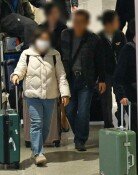Saffron Revolution in Myanmar Comes to Lull
Saffron Revolution in Myanmar Comes to Lull
Posted September. 29, 2007 03:43,
Myanmars demonstration for democracy came to lull on September 28, the 11th day of the event. In Yangon, the capital, and big cities like Mandalay, tensions rose amidst silence after the military government began a crackdown on dissenters two days ago. Meanwhile, the idea of possible intervention from the UN and the international community is gaining momentum.
People are focused at whether the so-called saffron revolution will show the power of the people in Myanmar. Saffron is the color of the robe of the monks, who spearheaded the protest.
Koreans in Myanmar advised to leave the country-
The Myanmar military and police have been cracking down on the demonstration for the past two days. On September 28, they sealed off five Buddhist monasteries and blocked all the main roads heading toward temples like the Shwedagon Pagoda.
The junta also took control of ten newspapers and magazines, including four weekly magazines. Internet websites and blogsites with articles or photos about the demonstration have been shut down, and landline and cell phone connections of monasteries, opposition party members, and student leaders have all been cut. In the outskirts, demonstrations are occurring sporadically, but the center of Yangon remains silent.
Concerns are rising among around 1,000 Koreans in Myanmar. Kim Mahn-yeong, the leader of the Korean Society, said, Since the schools are also closed down, we are advising people without urgent matters here to return to Korea. Oh Jae-ho, the KOTRA director of Yangon, said, Right now, the protests take place from 12 p.m., when the monks finish their worship, to 4 p.m. It is hard to predict whether the surge will continue or not.
One Korean in Myanmar said, The demonstration is meaningful in that the people of Myanmar, who were afraid of the junta after the 1988 protest, overcame that fear to fight for their rights. He also forecasted that the demonstration could spread nationwide. The Korean Embassy in Yangon has started to activate its emergency communication network with in-country Koreans and has come up with measures in case the demonstration chaos expands.
U.S. freezes assets of 14 high-level officers-
The U.S. froze the assets of 14 top Myanmar officials, including Than Shwe, the head of state, on September 27. President Bush urged Yang Jiechi, the Chinese foreign minister, for Chinas action to ease Myanmars transition to democracy.
The ASEAN leveled unprecedented criticism on the bloody rampage. The association had stipulated until now that it would never intervene with the domestic affairs of a member country. The foreign ministers of ASEAN member countries held a meeting in UN headquarters and urged the junta to stop using arms, showing their consternation.
The UN sent Ibrahim Gambari, a special envoy, after Myanmar approved his entrance, to monitor the situation.
lightee@donga.com spear@donga.com







